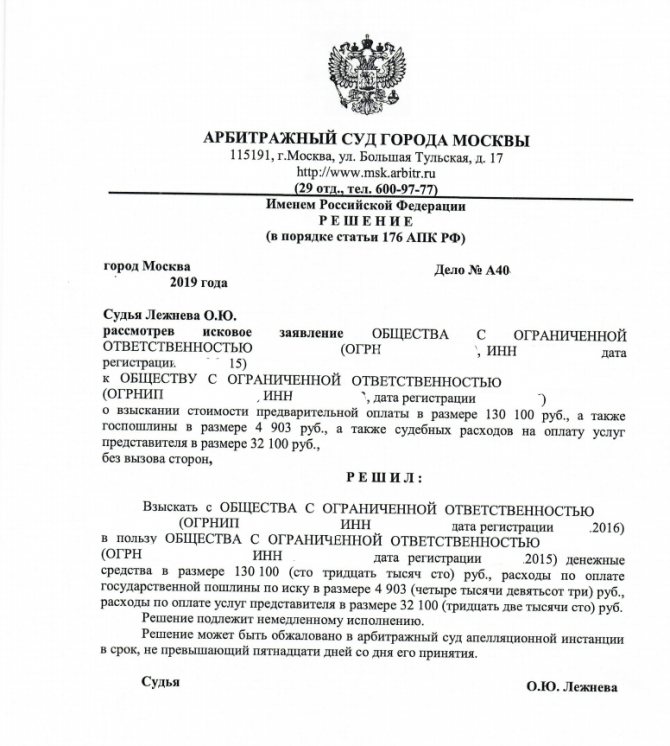To prove the invalidity of a transaction, you first need to have it declared void or voidable. If the transaction is void, it automatically becomes invalid. If the text of the contract or agreement contains signs of contestability, then you can file a claim to have it declared invalid. The problem is that both insignificance and contestability are not at all obvious. Without knowledge of the laws and without experience in analyzing documents, there is a risk that a claim will be filed on the wrong grounds, or you simply will not see that the deal or individual clauses in the contract are not legally binding.
Law: the grounds on which a transaction is declared invalid are described in Articles 166-181 of Chapter 9 of the Civil Code of the Russian Federation.
Grounds for invalidating a transaction
The conditions for recognizing transactions as invalid are clearly stated in the current Russian legislation.
If we follow the general rules, then a transaction is recognized as invalid even in cases where at first glance no violations are visible in its individual parts, but, nevertheless, its content does not comply with the requirements of the law.
It would be advisable to mention two types of transactions, which are referred to by law as imaginary and feigned, depending on the incentive of the participants to commit them:
- An imaginary transaction should be understood as a transaction made only for show, without the intention of giving rise to certain legal consequences, the occurrence of which would be expected if it were valid.
- A sham transaction is a transaction made with the aim of covering up another transaction in this way, which, as a rule, cannot be called legal.
In addition, it should be added that individual components of any transaction can be declared invalid. The reasons for this are the same conditions as in the case of the usual option.
In addition, if it is possible to complete a transaction by excluding from its content an element that is contrary to the law, then the transaction is considered valid to the extent that does not contradict the law.
For example, a person who took the life of a testator cannot be his heir, but such a circumstance does not detract from the right of other relatives to inherit property, and, therefore, the will is valid and will be recognized by the court as valid.
Procedure for invalidating a transaction
In accordance with the current civil legislation, a contestable transaction is declared invalid if there is a court decision to this effect. This procedure is quite fully reflected in the Civil Code of the Russian Federation.
A void transaction is invalid in itself, i.e. The parties to such a transaction may not fulfill it even without a court decision on completely legal grounds. However, in some cases, without a trial, it is impossible to unambiguously determine whether a transaction is void.
The law distinguishes between the requirement to recognize a transaction as invalid and the requirement to apply the consequences of the invalidity of the transaction.
The second obviously follows from the first, however, in some cases the court may recognize a transaction as invalid, but not apply the consequences of such invalidity. This situation arises if the application of consequences violates the principles of law and order or morality.
The demand to declare a voidable transaction invalid may be made by the parties to the transaction or by third parties if their rights or interests protected by law have been violated.
The requirement to apply the consequences of the invalidity of a void transaction can also be made by the parties to the transaction or third parties in certain cases established by law.
This clarification of the circle of third parties who can file such a claim was introduced into Article 166 of the Civil Code of the Russian Federation quite recently - on 05/07/2013.
Previously, any interested persons could make such a demand, and the law did not clearly define the concept of “interested person,” and different courts interpreted this term differently.
It should be noted that even today there is no normative act establishing an exhaustive list of such persons. Accordingly, it can be assumed that in judicial practice the issue of recognizing an applicant who wants to cancel a transaction to which he is not a party as a proper plaintiff will remain quite controversial.
As for the initiative of the judicial authorities in applying the consequences of the invalidity of a void transaction, today their right is also limited. The court cannot now independently, out of its own conviction, carry out such procedural actions.
Currently, the court has such an opportunity only if there is a violation affecting public (i.e. public and state) interests.
In addition, it is worth noting that a party may lose the right to have a transaction declared invalid. For example, if, long before such a procedure, she had information regarding the existence of grounds for challenging the agreement, as well as in cases where this party made it clear by all its behavior that the concluded transaction was valid.
You might be interested in the “Selling a Car” mind map? describing the procedure for completing this transaction.
Or see HERE how to file a private complaint against a court ruling.
And in THIS ARTICLE you will learn how to get your money back for a low-quality product.
Customer Reviews
Gratitude from gr. Kolesnikova A.N. Let me express my deep gratitude to the Legal Agency of St. Petersburg, located at Spassky Lane, 12. For their professional and friendly assistance in resolving my issue! I wish to continue working, bringing benefit to all residents of St. Petersburg. And not only.
Kolesnikov Alexander Nikolaevich.
Position: Head of the Metro Implementation Sector
PS: Before your company, I contacted 5 companies on this issue and received unclear answers.
Gratitude from N.A. Uvarova I express my deep gratitude to lawyer Sergei Vyacheslavovich for his attitude towards me and my question. There are no words to describe the feelings of gratitude for the professionalism shown and the greatest human sympathy and understanding! All the best to you! Health, success in work and long life!
Thank you very much! Sincerely, Nadezhda Anatolyevna Uvarova, 07/25/2019
Gratitude from N.A. Tomashpolskaya I would like to express my deep gratitude to Alexander Viktorovich Pavlyuchenko for his competent legal advice and sensitive, attentive attitude towards me, who found myself in a difficult situation.
Sincerely, Tomashpolskaya N.A. 07/01/18
Gratitude from Remedova A.G. I express my gratitude to the Legal Agency of St. Petersburg, namely Denis Yuryevich Stepanov, for the assistance provided in resolving my issue, and I also express my gratitude to the entire team of the consumer rights protection society for their responsiveness and pleasant communication.
Remedova A.G. 08/17/2018
Gratitude from Loseva S.I. I express my deep gratitude to Sergei Vyacheslavovich (lawyer of the firm) for his very clear, accessible help in solving my problem (protecting rights as a consumer). This is the second time I have contacted you to solve my problems. Always everything......and in full.
With gratitude, Svetlana Ivanovna Loseva, 02/15/2019
Gratitude from Ivanov I express my gratitude to Vasily Anatolyevich for the correct and competent legal assistance in solving my case. I wish you and your entire company prosperity and success.
With all my heart, V.V. Ivanov. 05/10/2018
Thanks to Stepanov D.Yu. I express my deep gratitude to lawyer Denis Yuryevich Stepanov for his high professionalism and attentiveness to his case when considering the issue in word with a contractor who improperly completed the work of erecting a screw foundation. The cost of the work amounted to 178,300 rubles. And the court of the Vyborg district (Case No. 2-1432/2018) dated March 12, 2018) to collect, taking into account all fines, 504,800 rubles. Once again, I thank you and wish you success in your future work and only successful business conduct.
Grateful to you, your client. 05/18/18
Gratitude from Potapova T.I. I express my gratitude to Denis Yuryevich Stepanov for the work done, high qualifications, as well as for very clear, accessible help in solving my problem (protection of consumer rights). Excellent, very competent lawyer. Thank you very much!
Sincerely, Potapova Tamara Ivanovna, 07/09/2019
Thanks to A.I. Ivanov I would like to express my gratitude to the team of the “Legal Agency of St. Petersburg”, and especially to Artem Igorevich Ivanov, for the competent actions and decision in my civil case. I dare say that this is one of the best law firms in the city, because... I became very close to the lawyers. Everything is done in a timely manner and to the point. Good luck to the team in everything.
Sincerely, Nadezhdin A.N. June 7, 2018
Thanks from Radhuan M.R. Dear Kavaliauskas Vasily Anatolievich. Let me express my sincere gratitude for the qualified legal assistance provided. Thanks to your professionalism, I was able to achieve a decision in my favor. I wish you further prosperity and professionalism.
Radhuan M.R. 06/08/2018
What are the legal consequences of declaring a transaction invalid?
So, the stage of declaring the transaction invalid has passed. The court came to the conclusion that this legal fact cannot be considered valid, since there is a clear discrepancy with the current legislation. Therefore, it’s time to think about the consequences of declaring a completed transaction invalid.
If the parties did not manage to fulfill this agreement, in this case the actions are elementary, since everything that the participants in civil legal relations came to is simply canceled.
But what to do if there was full or partial fulfillment of the result of the concluded agreement. It is in such situations that the question of possible property consequences should be considered.
As a rule, when it comes to the legal consequences of declaring a transaction invalid, it is time to take advantage of the opportunity of restitution, that is, the parties can return to their original position.
To understand the essence of this concept, it is enough to turn to the origins of ancient Roman law. After all, translated from Latin, “restitution” is an attempt to restore, return rights. In the interpretation of this concept by modern legislation, little has changed; the participants in a transaction declared invalid still expect to return the lost right.
In practice, there are restitution of possession and compensation.
In the first case, the right to demand the return of an individually defined item is implied, when there is a possibility of returning the property received under the transaction.
By the way, a participant who relies on restitution in order to reclaim his property is not required to provide any evidence confirming ownership of such property. In addition, the party simply may not have such authority.
Thus, in situations where the initiator of the alienation of a particular item is a minor or an incapacitated person, or the agreement was concluded under the influence of fraudulent actions, misleading the party, and also if one of the participants was under the influence of a combination of difficult circumstances, the property must be returned.
In this case, the existence of the right to the alienated thing does not matter. For example, a young son, who had not reached the age of fourteen, decided to dispose of his father’s property by selling it.
In this case, the things are unconditionally returned to their owner, without paying attention to the fact whether the “seller” had property rights to this property.
If we talk about the compensatory nature of the return of things, then if they are lost, the party can safely count on replacing this property with a cash equivalent. We are also talking about monetary compensation of value if, under an invalid transaction, not property was received, but work or services.
If the guilty party refuses to act in this way, it is appropriate to talk about his desire to unjustly enrich himself.
Help from a lawyer in contractual disputes in Yekaterinburg
Challenging transactions is not as simple a task as it might seem. In contractual disputes, it is important to correctly determine the tactics of action and the essence of the stated claims when challenging. An incorrect choice of the method of defense, or the statement of not all the requirements that are necessary for a specific contractual dispute, may lead to the refusal of the claim.
The lawyers of our Law Office “Katsailidi and Partners” work with cases related to contractual disputes, have practical experience in challenging and know what to look for when challenging transactions. When you contact our lawyers, you can count on:
- for consultation on challenging transactions
- to study documents on your situation, assess the possible outcome of a legal dispute, as well as propose an algorithm of actions in your situation
- to prepare a lawsuit, response, objections
- to request additional evidence if it can be obtained
- to represent the interests of the principal in a legal dispute
- to prepare a complaint against a court decision or a response to the complaint of the second party in the case
- for the provision of other services regarding the dispute that has arisen, including services for resolving a dispute through mediation
Bilateral restitution
This consequence is characterized by the obligation of each party to return all property received as a result of the transaction.
If there is no possibility of returning the item in kind, this issue is resolved by assigning material compensation equivalent to the value of the lost property. With this approach, the participants in legal relations return to their original position.
As follows from the provisions of civil law, bilateral restitution is resorted to in almost all cases when it comes to the invalidity of a transaction.
Especially if there is a disregard for such transaction requirements as:
- conclusion of an agreement in violation of its form;
- in the absence of legal capacity of a legal entity;
- non-compliance with the provisions of the law regarding mandatory state registration of transactions;
- if the subjects are citizens deprived of the right to perform such actions for one reason or another.
However, the law may indicate other options for applying property consequences.
Oral expression of will of only one of the parties
The conclusion of an oral contract provides for the possibility of verbally expressing one’s intentions and desires on behalf of one of the parties, which is the subject of the situation. One of the most common cases of oral expression of the will of one party in modern legal practice is the conclusion of an insurance agreement.
The corresponding contract is concluded in the following way: the insurer hands the policyholder an official policy in the form of a certificate, personal certificate or a special receipt. The insurer carries out these actions after a written or oral statement on behalf of the policyholder, which must be certified by a representative of the insurer.
In this case, the consent of the insured person to the upcoming conclusion of an agreement on the established conditions is considered confirmed after the insurance company accepts the specified list of documents.
Unilateral restitution
This consequence is that if the transaction is executed, the property is returned only to one party, who will be recognized as a bona fide participant. And the part that would have been due to the other unscrupulous party goes to the benefit of the state.
In cases where the agreement has not passed the stage of execution, only that part that is subject to execution is turned into state income, that is, this circumstance is subject to the obligation of confiscation.
For the most part, we can talk about the possibility of unilateral restitution if such actions were committed under the influence of dishonest contractors. For example, a person decided to enter into a transaction under the influence of deception on the part of another participant in such legal relations.
Court decisions
Problems with the travel agency

Collection and actual receipt of debt from a Moscow company in the Moscow Arbitration Court WITHOUT traveling to Moscow in 2.5 months.
The mobile operator paid for the error
What are the consequences of paying a small fine for an administrative offense?
Compensation for damages in favor of the buyer
Debt in payment is red: the case of collecting payment for services and penalties under a construction contract






